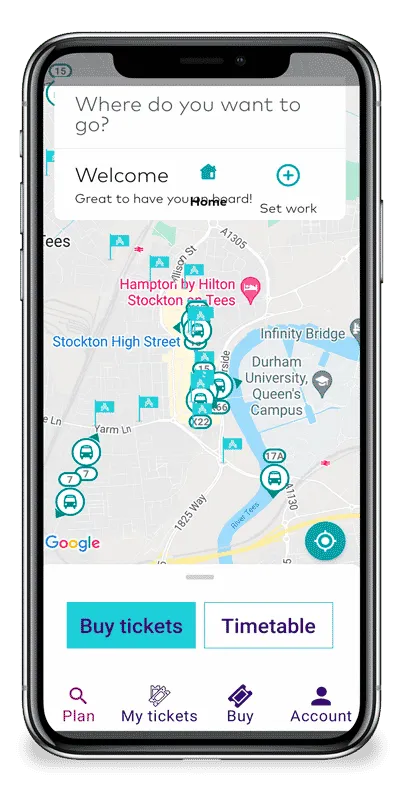Project Overview
Arriva Bus is a major bus-operating company in the UK, providing transport services in major cities. The company wanted to revamp and relaunch their website and mobile apps to improve the user experience and reflect changes in their business needs.
Solution & Strategy
Challenges
- Outdated UI/UX: The previous website and apps had an outdated user interface (UI) and user experience (UX), which negatively impacted the usability and satisfaction of users. The UI/UX needs to be redesigned to align with modern design principles and improve the overall aesthetic appeal, ease of navigation, and intuitive interaction.
- Fragmented Journey Planning and Ticket Booking: The functionality for planning bus journeys and booking e-tickets was divided between two separate apps, causing inconvenience for users. The challenge was to integrate these functionalities into a unified platform, providing a seamless experience for users to plan their journeys and purchase tickets in a single application or website.
- Quality Assurance (QA) team undertook comprehensive testing of CRM integrations, focusing on platforms like Zendesk as well as their connections with email systems, and billing platforms.
- QA Management for Microservices and Third-Party Applications: Arriva’s ecosystem involved a large number of microservices and third-party applications. Ensuring the quality, reliability, and interoperability of these components was crucial. This challenge requires a comprehensive QA management service and solution that covers testing and validation of the various microservices and integrations with third-party applications.
Arriva required a complete QA management service and solution that included:
- Manual testing
- Automation testing
- Load/performance testing
- Accessibility testing
- API testing

A modern and intuitive user interface (UI) design was developed that aligned with current design trends and enhances the overall user experience (UX). This included improving navigation, simplifying ticket purchasing, optimizing journey planning, and making information easily accessible. Usability testing was conducted to gather information and iterate on the design.
QA Management Service and Solution:
Provided Arriva with a comprehensive QA management service that included manual testing, automation testing, load/performance testing, accessibility testing, and API testing. This ensured thorough testing coverage across different aspects of the website and apps.
CRM Integration Testing: Zendesk
The QA process encompassed the integration between Zendesk, ensuring seamless synchronization of data and workflows. This included:
• Data Synchronization: Verifying that customer data, support tickets, and case information flowed accurately to Zendesk
• Workflow Validation: Ensuring that actions in one platform (e.g., ticket updates in Zendesk) reflected appropriately
• User Access and Permissions: Testing role-based access controls to confirm that users had appropriate permissions to the platform
• Error Handling: Assessing the system’s ability to handle integration errors gracefully, with proper logging and notifications.
Email Systems Integration:
The QA team also focused on the integration of email systems, which are vital for customer communications and notifications. This involved:
• Email Trigger Testing: Validating that actions in the CRM (e.g., ticket creation or updates) triggered appropriate email notifications.
• Template Verification: Ensuring that email templates rendered correctly and contained accurate dynamic content.
• Deliverability Checks: Confirming that emails were successfully sent and received, and that bounce handling mechanisms functioned as expected.
Automation Testing Strategy:
Divided the project into individual components and flows, identifying repetitive tasks that could be automated to reduce manual work. Developed automation test scripts using appropriate frameworks and tools for different platforms (Web, Android, and iOS) to cover end-to-end (E2E) flows, including journey planning, timetable search, live departures, and transactions. Implemented the Page Object Model for maintainable and reusable test code.
Test Case Management:
Created comprehensive test cases for all epics, stories, and tasks using TestRail, a test management tool. This allowed for organized test case management, traceability, and easy tracking of testing progress.
API Testing Strategy:
Utilized various tools to debug network requests and validate API requests/responses. For Android, used Chuck, for iOS, used DB debug tool, and for the web app, utilized web developer tools. This enabled efficient testing and verification of API functionality and integration.
Web App Automation:
Automated end-to-end flows for the web app, covering essential functionalities such as journey planning, timetable search, live departures, and transactions. Implemented the automation framework using Cypress, along with Mocha/Chai reports for test execution and reporting. Deployed the code on Bitbucket for version control and collaboration.
Mobile App Automation:
Used Appium to automate E2E flows for both Android and iOS platforms, ensuring code reusability and reducing duplication. Implemented the Page Object Model for maintainable and scalable test code. Wrote the automation code in Typescript and generated Allure reports for enhanced test reporting and analysis. Automated complex scenarios, including handling third-party module overlays.
API and Payment Integration Testing:
Utilized Postman to test the HAFAS API, which provides journey planner and timetable information. Integrated and tested the Braintree API for ticket transactions. Implemented additional features such as print-at-home ticket generation and user account management, ensuring thorough testing of these functionalities.

Conclusion
The launch of the revamped Arriva Bus website and mobile apps has been a resounding success, thanks to our comprehensive QA management service and solution. Through rigorous manual testing, we ensured the functionality, usability, and compatibility of the platform, transforming the outdated UI/UX into a modern and intuitive design.
Automation testing streamlined the process, covering end-to-end flows for the web app, Android, and iOS platforms, including journey planning, timetable search, live departures, and transactions.
Load/Performance testing guaranteed optimal performance during peak usage, while accessibility testing ensured compliance with standards, making the platform inclusive for all users.
API testing validated functionality and integration with third-party applications. With our efforts, Arriva Bus now offers a seamless user experience, enabling convenient journey planning, ticket booking, and access to vital information.
The successful launch and positive feedback are a testament to our commitment to delivering a high-quality digital platform.

